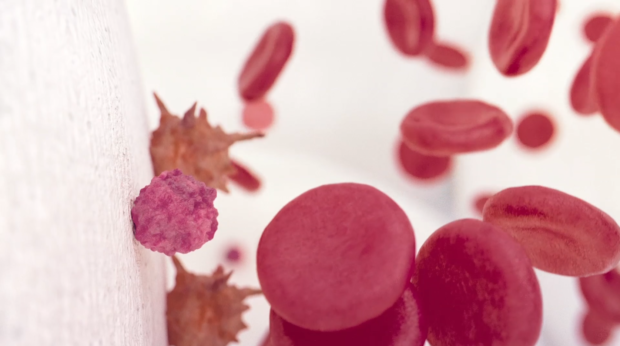Suffering from an inflammatory bowel disease like ulcerative colitis1 does not need to an obstacle to travelling. Some patients may perhaps think that doing this type of travelling carries more risks than needed, but nothing could be further from the truth. Good planning performed with the help of the medical professionals in charge of the patient is the best option for travelling peacefully.
News
Aspects to be taken into account when travelling with ulcerative colitis
July 28, 2022
Patient

The best time for taking a trip, whether for business or leisure, is when they are in remission. Hence the need to find a treatment that has a longer relapse-free period and where applying a systemic maintenance therapy is no longer needed. Studies2 were performed on leukocyte apheresis3 a few years ago that showed the efficacy of this method, providing an average duration of clinical remission of around 10 months (Ljung et al 2007)4.
Taking this into account, and even though the remission rates and duration differ depending on each patient profile, selective granulocytoapheresis (GMA) has been shown to be an effective tool for inducing clinical remission in patients with ulcerative colitis. For that reason, it is a part of the healthcare professional’s therapeutic arsenal for improving the quality of life of patients with ulcerative colitis.
What must be taken into account with respect to drugs for treating ulcerative colitis?
Even though the period of clinical remission has been increased thanks to leukocyte apheresis treatment, the patient sometimes needs to go travelling when they are suffering a flare-up, or a relapse may even start during the trip itself.
In such cases, patients that are going to travel need to take a few precautions regarding the drugs they are using to treat their disease. For example, taking extra drugs is recommended in case of unforeseen circumstances, keeping them in the original packaging to make them easier to identify, and it is recommended to take 2-3 days’ worth of medicine in cabin luggage if travelling by air.
On the other hand, when biologics have to be taken, these should be carried in a cooler bag with refrigerants so that the cold chain remains unbroken.
It is also advisable to take anti-diarrhoeal and antispasmodic drugs, oral rehydration solution (ORS), analgesics and even antibiotics for cases where the traveller has diarrhoea or fever with bloody stools. If no ORS is available, a substitute mixture of 1 litre of bottled water, 6 tablespoons of sugar and 1 tablespoon of salt can be made.
Documentation the patient should carry regarding their disease
One of the essential documents the patient should carry on them is an updated medical report where the generic names for their drugs are included, especially if they are immunosuppressive (corticosteroids, azathioprine, mercaptopurine, methotrexate) or biological treatments. This document is mandatory if the patient is travelling by air as proof of the drugs they are carrying in their hand luggage, so that no problems arise when accessing it. Furthermore, it is advisable that the report be written in English when travelling abroad.
It is also advisable to take drug prescriptions that contain the patient’s full name and surname and their date of birth; the prescription’s issue date; details of the doctor prescribing the drug (name and surname, contact details, license number, specialisation, address and signature); and the details of the prescribed drug (active ingredient, amount, daily dose, regimen, pharmaceutical form and brand name).
Additionally the patient can ask their doctor to prepare an emergency action plan in case they suffer a flare-up during the trip or the disease worsens.
Other documentation that is recommended to always carry on them whilst travelling with ulcerative colitis is the contact number for the doctor treating the patient, their health card (Spanish if it is a domestic trip or European if the destination is a country within the European Union) and the receipt for health insurance purchased for trips abroad covering healthcare in the country they are travelling to. And. specifically, insurance covering possible issues linked to Inflammatory Bowel Disease.
Other aspects to be taken into account when travelling with ulcerative colitis
Recommendations that the patient must consider adopting a preventive attitude in terms of food whilst travelling. Namely, drinking bottled water, boiled or treated for drinking and brushing teeth; not having ice in drinks; avoiding raw food (like vegetables, salads, etc.); not ingesting street food; or peeling fruit. All of this aimed at avoiding a flare-up of ulcerative colitis or a deterioration.
Additionally, emphasis is placed on the importance of locating bathrooms whilst travelling. Especially so the patient feels more confident. To this effect, there are countries like Great Britain where it is easier to find public bathrooms thanks to applications like The Great British Public Toilet Map5, which is very useful for patients with ulcerative colitis and Crohn’s disease, as well as for the general public.
They have also published the IBD Passport6 website (available in Spanish) in this country where travellers with inflammatory bowel disease (IBD) can find further advice and information on the disease.
And if patients with ulcerative colitis need any type of help, they can get in touch with the patient associations that participate in the EFCCA7, the European Federation of Crohn’s & Ulcerative Colitis Associations, whether they are in Spain or in other countries8.
Lastly, they should not forget to ask their doctor about vaccination recommendations9 if they are going to travel to Asian, South American or African countries. Furthermore, if there is a high probability of contracting yellow fever in said country, it is not advisable for the patient to travel to this destination10.
- What is ulcerative colitis? – Adacyte
- https://www.aegastro.es/publicaciones/publicaciones-aeg/protocolos-asistenciasles-prodiggest/uso-racional-de-la-granulocitomonoaferesis-en-la-enfermedad-inflamatoria-intestinal
- Adacolumn® – Adacyte
- https://www.aegastro.es/publicaciones/publicaciones-aeg/protocolos-asistenciasles-prodiggest/uso-racional-de-la-granulocitomonoaferesis-en-la-enfermedad-inflamatoria-intestinal
- https://www.toiletmap.org.uk/
- https://www.ibdpassport.com/
- https://www.efcca.org/
- http://www.efcca.org/en/members
- http://www.vivirconeii.es/viviendo-con-eii/el-estilo-de-vida-importa/viajes
- https://www.mscbs.gob.es/profesionales/saludPublica/sanidadExterior/salud/viajesInter/home.htm
Contact UsFor more information
Contact Us
